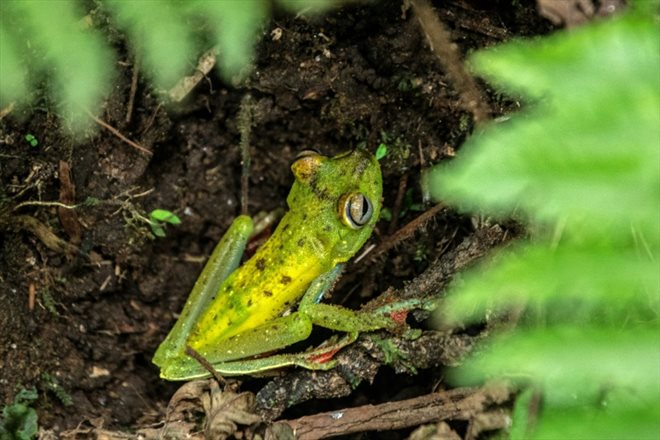The turquoise waters of the Rio Celeste and its famous waterfall, near the Tenorio volcano in Costa Rica, May 24, 2023 (AFP / Ezequiel BECERRA)
In northern Costa Rica, on the flanks of the Tenorio Volcano and the shores of the famous Rio Celeste’s turquoise waters, the indigenous Maleku people vainly claim their share of the fallout from tourism on their ancestral lands.
In the Cordillera de Guanacaste, about 200 km north of the capital San José, a small lake and its thirty-meter high waterfall on the “Rio Celeste” delight a thousand tourists every day who capture on their cameras the astonishing color revealed by the sun of the mixture of acidity, copper and aluminum silicate from volcanic lands.
In the heart of the forests of the Tenorio Volcano National Park and its 18,000 hectares populated by a rich fauna, this natural wonder of which it is the jewel is on “a maleku indigenous area”, recognizes the guide of the National Park, Félix Rojas.
But visitors never go as far as the small indigenous village of Palenque Margarita, where indigenous Maleku have nevertheless prepared a whole program for them to discover their ancestral culture at the price of 65 dollars per person.

Dagoberto Elizondo, member of the Maleku ethnic group during an interview with AFP on May 24, 2023 (AFP/Ezequiel BECERRA)
“Our visit includes a discovery of medicinal plants, artistic activities, archery, a traditional Maleku ceremony in costume, a typical cuisine lunch … all in the Maleku jaica language,” Dagoberto told AFP. Elizondo, who waits in vain for the barge.
The sandy streets of the village, dotted with signs in Spanish, English and maleku jaica, advertise a tourist alternative without much success with passengers disembarking from their buses.
– “Sacred places” –
It has been months since a customer has come to the door of Dagoberto Elizondo’s palm-roofed house, fragrant with the aroma of cocoa beans, slowly roasted on the hearth.

Tourists visit the famous waterfall on the turquoise waters of the Rio Celeste, near the Tenorio volcano in Costa Rica, on May 24, 2023 (AFP/Ezequiel BECERRA)
“In the indigenous territories of Costa Rica there is practically no work. What are we going to live on? Today we need money for everything”, laments the guide.
The Maleku ethnic group is one of eight indigenous peoples of Costa Rica, which together represent 2.4% of the country’s 5.2 million inhabitants.
The maleku, who claim the Rio Celeste as part of usurped ancestral lands, complain bitterly that the Costa Rican government pockets the entrance fees to the National Park without them benefiting from it.
Today, only three villages occupy less than half the territory, according to the indigenous rights organization IWGIA.
This territory of the Rio Celeste, deplores Dagoberto Elizondo, “we lost it, now it is in the government. The indigenous cultures are practically of no interest to the governments” of Costa Rica.
The small Central American country has nevertheless adhered to the United Nations Declaration on the Rights of Indigenous Peoples and the Convention of the International Labor Organization (ILO) on their rights to land.

A frog in Tenorio Volcano National Park in northern Costa Rica on May 24, 2023 (AFP/Ezequiel BECERRA)
The river and the volcano are “sacred places” for the maleku, reports to AFP Jenny Lacayo, a 50-year-old native of Palenque Margarita, who has also set up a “cultural and tourist” program.
When a maleku feels he is going to die, he chooses a place where his soul should go, usually the volcano or the source of the Rio Celeste, she explains.
According to the tradition of the indigenous people, visitors to the Park should purify themselves before entering by consuming cocoa, a sacred food for the maleku. But no one explains to tourists the “spiritual” dimension of the place, deplores the indigenous guide.
© 2023 AFP
Did you like this article ? Share it with your friends with the buttons below.




